|
|
|
Sort Order |
|
|
|
Items / Page
|
|
|
|
|
|
|
| Srl | Item |
| 1 |
ID:
184762


|
|
|
| 2 |
ID:
184768
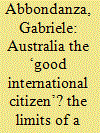

|
|
|
|
|
| Summary/Abstract |
Australia is often described as a ‘good international citizen’ (GIC), which is intertwined to its status of ‘quintessential’ middle power. However, a number of elements might undermine both notions. This research reviews the concept of GIC and contributes to this niche of IR theory by providing a dedicated definitional framework, which consists of: i) the respect of the international law; ii) multilateralism; iii) the pursuing of humanitarian and idealist objectives; iv) an active support for the rules-based order; and v) a congruous identity matched by consistent domestic policies. After assessing the country’s foreign and domestic policies against this, it finds that Australia has damaged its GIC credentials due to a number of reasons, including: the hard-line policies against seaborne asylum seekers; the participation in missions that are not sanctioned by the UN; the transformation of its global multilateralism into a selective regionalism; the budget cuts to foreign aid; a controversial attitude towards climate change mitigation; and a preference for the US-led global order over a rules-based international society. Far from criticising the country’s foreign policy in its entirety, it argues that in the 21st century Australia behaves as a ‘neutral international citizen’, and a traditional but not ‘quintessential’ middle power.
|
|
|
|
|
|
|
|
|
|
|
|
|
|
|
|
| 3 |
ID:
184763
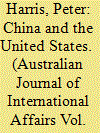

|
|
|
|
|
| Summary/Abstract |
How can ties between the United States and China be restored to good health? In this provocation, I argue that the deterioration of US-China relations has become so severe that it is now incumbent upon China's leaders to pursue the “smart appeasement” of the United States – that is, to take dramatic measures designed to pull the rug from under anti-China forces in America while strengthening the hand of those who wish for more stable and productive Sino-American relations. I acknowledge that the language of appeasement is unlikely to win over many converts in Beijing. But the reality is that China's own national interests – not to mention the broader interests of the international community – are dependent upon America's domestic conversation on China policy taking a sharp turn for the better. Only Chinese leaders have the power to bring about such a shift in how China is perceived in US politics. Simply put, China has no choice but to try to rescue its most important bilateral relationship. In turn, this means something approximating the policy of smart appeasement outlined here.
|
|
|
|
|
|
|
|
|
|
|
|
|
|
|
|
| 4 |
ID:
184765
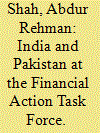

|
|
|
|
|
| Summary/Abstract |
Ever since the grey-listing of Pakistan by the Financial Action Task Force (FATF) in early 2018, India and Pakistan have been vying for competing goals. According to Indian perspective, Pakistan is still engaged in cross-border terrorist activities in Indian territories. Therefore, Pakistan must be downgraded to black-list. On the other hand, Pakistan insists it has taken ample measures to comply with FATF demands. According to Islamabad, not only has Pakistan started taking actions against domestic militant units, it has been playing vital role in facilitating ‘peace talks’ to end the Afghan war. In contrast, this article argues both of these narratives verge on extremes in their own respects. India’s recent claims about cross-border terrorism are profoundly diluted by domestic resistance it has been facing in Indian-administered Kashmir of late. Moreover, a black-listed Pakistan could pose an even bigger challenge. Similarly, this article argues that getting Pakistan off the grey list would be too early at the present time. The country still needs to implement half of its ‘action plan’ as identified by the FATF. A more realistic option, therefore, would be to take the middle ground and proceed with current FATF supervision of Pakistan’s performance for a further period.
|
|
|
|
|
|
|
|
|
|
|
|
|
|
|
|
| 5 |
ID:
184769
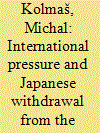

|
|
|
|
|
| Summary/Abstract |
Shaming in international relations has been extensively analysed as a normative practice that aims to persuade the target to comply with certain norms. Recently, IR scholars have identified cases, in which this process failed or antagonised the target. But although these studies have shown us how shaming works, they have not fully explained under what conditions shaming works. To remedy this, the article analyses the role of shaming in Japanese whaling controversy. In 2018, Japan announced its withdrawal from the International Whaling Commission, defying three decades of sustained international pressure. I identify two versions of shaming of Japanese whaling: premoratorium ‘soft' and post-moratorium ‘hard' shaming. The former, although less confrontational, had normative impact on Japanese society and policymaking, leading Tokyo to accept the moratorium and scale down on its whaling operations. The latter, marked by attacks of NGOs and heated discourse, had an opposite outcome and helped conservative policy entrepreneurs formulate a ‘cultural wars’ narrative that prevented the inception of anti-whaling norm. The reason for this difference, I argue, lies in Japanese domestic political culture, which played a defining role in the success/fail of shaming strategies. For shaming to be successful then, careful understanding of the target society is essential.
|
|
|
|
|
|
|
|
|
|
|
|
|
|
|
|
| 6 |
ID:
184767
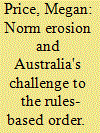

|
|
|
|
|
| Summary/Abstract |
Australian foreign policy makers increasingly place an emphasis on the importance of rules and norms. These foreign policy statements reflect concerns about China's growing assertiveness combined with the belief that a ‘thick’ anarchy is safer for middle powers. Yet while Australia has been fixated with how China poses a threat to the international order, at times, Australia has actively challenged that order itself. Such was the case when the Prime Minister gave an address on ‘negative globalism’ at the Lowy Institute in October 2019. This article advances a theoretically grounded framework for understanding how these performative challenges arise and come to cause norm erosion. The framework draws together three elements: the rule or norm in question; representational strategies; and domestic audiences. The article illustrates this framework using the example of the Prime Minister's Lowy Institute address.
|
|
|
|
|
|
|
|
|
|
|
|
|
|
|
|
| 7 |
ID:
184766
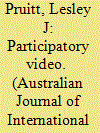

|
|
|
|
|
| Summary/Abstract |
This article considers the implications of incorporating participatory video in International Relations (IR) research. Drawing on existing aesthetic and visual IR research, I critically reflect on a case study incorporating participatory video in research investigating young women’s leadership in Asia and the Pacific. Through participatory video, young women redressed their common invisibility and challenged portrayals situating them as unable to lead and make decisions. In this way, participatory video disrupted and unsettled power relations often resulting in young people’s marginalisation from policymaking. Given its ability to make space for productive reflections on, and challenges to, existing power dynamics amongst and between researchers, research participants, and the state, participatory video can productively push the boundaries of IR research. Limitations and challenges of using participatory video are also evident and require reflection. Overall, I suggest that participatory video can generate new critiques and knowledge to productively shape current and future IR research, including through offering unique insights that could be missed by other methods in IR, including other filmmaking approaches.
|
|
|
|
|
|
|
|
|
|
|
|
|
|
|
|
| 8 |
ID:
184770


|
|
|
|
|
| Summary/Abstract |
Empirical models illustrating how mass publics organise their views on foreign policy issues abound. Models that posit militant internationalism and cooperative internationalism as the two factors structuring mass foreign policy attitudes and that typically rely on American survey data have given way to models positing a larger number of underlying factors supported by cross-national survey data. Still, there are few studies assessing the cross-national validity of multi-factor models. Further, middle power states that must navigate between international leadership and followership remain understudied. This article draws on new survey data from Canada and Australia—two archetypal middle power states—to replicate a recent and influential model of foreign policy attitudes comprised of four factors: cooperative internationalism, militant internationalism, isolationism, and support for global justice. Using an exploratory structural equation modelling (ESEM) framework, it finds that the four-factor structure of foreign policy attitudes observed in the United States, United Kingdom, France and Germany obtains among the Canadian and Australian publics, yet there are country-specific nuances that suggest differences in the ways Canadians and Australians perceive foreign policy options.
|
|
|
|
|
|
|
|
|
|
|
|
|
|
|
|
|
|
|
|
|